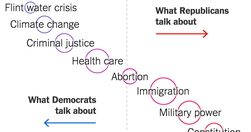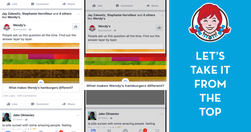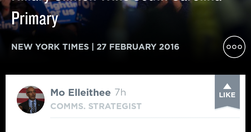Filter 1338 resources:
- media (468)
- news (369)
- disinformation (252)
- facebook (196)
- social media (173)
- journalism (152)
- curation (131)
- content strategy (95)
- community (94)
- comments (94)
- filter bubble (75)
- publicsphere (69)
- algorithm (60)
- native advertising (57)
- us2020 (56)
- ai (55)
- factchecking (55)
- eu (53)
- psychology (51)
- longform (47)
- trump (46)
- advertising (46)
- storytelling (39)
- data journalism (39)
- bloggingportal (36)
- twitter (34)
- politics (33)
- trust (33)
- troll (33)
- podcast (31)
- google (29)
- polarization (27)
- audiovisual (27)
- medium (26)
- content (26)
- augmented reality (26)
- instant articles (26)
- innovation (25)
- mobile (25)
- covid19 (25)
- propaganda (24)
- engagement (24)
- democracy (24)
- us (24)
- multilingualism (24)
- ocm (22)
- newsletter (22)
- bias (21)
- nytimes (20)
- bot (20)
- tool (20)
- science (20)
- video (20)
- identity (19)
- metrics (19)
- conspiracy (19)
- myhub (19)
- content marketing (18)
- data (18)
- explainer (17)
- newsroom (17)
- cognitive (17)
- productivity (17)
- censorship (17)
- brexit (17)
- bullshit (17)
- politicoeu (16)
- enewsletter (16)
- delegitimise (16)
- blogging (16)
- data visualisation (15)
- bbc (15)
- regulation (15)
- open web (15)
- fediverse (15)
- semantic (15)
- online architecture (14)
- promotion (14)
- platform (14)
- science journalism (14)
- amp (13)
- clickbait (13)
- communications (13)
- blog (13)
- design (13)
- cms (13)
- bloggingportal2 (13)
- privacy (12)
- groupthink (12)
- ea (11)
- web20 (11)
- blockchain (11)
- machine learning (11)
- cambridge analytica (10)
- virtual reality (10)
- media literacy (9)
- science communication (9)
- atprotocol (9)
- atomisation (9)
- llm (9)
- hoax (9)
- post-truth (9)
- business model (9)
- backfire effect (9)
- visualisation (9)
- domestic (9)
- qanon (9)
- russia (9)
- brussels bubble (8)
- bxlsbbl (8)
- usa (8)
- open source (8)
- blogpocalypse (8)
- crowdsourcing (8)
- vote (7)
- interactive (7)
- chatgpt (7)
- populism (7)
- marketing (7)
- web (7)
- ai4communities (7)
- circa (7)
- copyright (7)
- sponsored content (7)
- quartz (7)
- gtd (7)
- buzzfeed (7)
- authenticity (7)
- tribe (6)
- linkedin (6)
- moderation (6)
- ux (6)
- europe (6)
- app (6)
- information (6)
- monetisation (6)
- pay4content (6)
- seo (6)
- knowledge management (6)
- apple (6)
- euractiv (6)
- eurosceptics (6)
- suppress (6)
- web design (6)
- snapchat (6)
- 2ndbrain (6)
- fascism (6)
- headline (6)
- ec (6)
- bestof2015 (6)
- event (5)
- climate (5)
- moments (5)
- theme (5)
- audience research (5)
- pr (5)
- guardian (5)
- persuasion (5)
- jeff jarvis (5)
- bluesky (5)
- gender (5)
- nlp (5)
- framework (5)
- society (5)
- dni (5)
- analytics (5)
- vox (5)
- editorial (5)
- cory doctorow (5)
- personal (5)
- narratives (5)
- substack (5)
- machine translation (5)
- anti (5)
- instagram (4)
- collaboration (4)
- guide (4)
- creativity (4)
- yanss (4)
- futurism (4)
- free speech (4)
- confirmation bias (4)
- top3pods (4)
- viral (4)
- notification (4)
- education (4)
- meme (4)
- blm (4)
- wikipedia (4)
- ethics (4)
- strategy (4)
- zettelkasten (4)
- culture (4)
- bundle (4)
- antivaxxer (4)
- influence (4)
- chat (4)
- publishing (4)
- hate (4)
- solutions journalism (4)
- partisan (4)
- coral (4)
- credibility (4)
- lobby (4)
- tv (4)
- inoculation (4)
- fbpaper (4)
- surveillance (4)
- sceptic (4)
- corporate journalism (4)
- europa (4)
- stream (4)
- context (4)
- realtime (4)
- uk (4)
- startup (4)
- sublime (4)
- future (4)
- motivated (3)
- youtube (3)
- (3)
- faq (3)
- outrage (3)
- signal2noise (3)
- search (3)
- infowar (3)
- policy (3)
- collective intelligence (3)
- decentralised (3)
- euroblog (3)
- infopocalypse (3)
- aggrefilter (3)
- participation (3)
- personalisation (3)
- mobocracy (3)
- homepage (3)
- machine text (3)
- attentionweb (3)
- crowdfunding (3)
- misinform (3)
- visual (3)
- radio (3)
- debunk (3)
- eurosceptic (3)
- deep fake (3)
- english (3)
- semanticweb (3)
- gamification (3)
- echo chamber (3)
- livestream (3)
- gpt-x (3)
- wapo (3)
- slack (3)
- blogactiv (3)
- explanatory (3)
- adblock (3)
- coda (3)
- vine (3)
- rebelmouse (3)
- paper (3)
- cards (3)
- paywall (3)
- management (3)
- digital transformation (3)
- share (3)
- local (3)
- portal (2)
- humour (2)
- infographic (2)
- addiction (2)
- brand (2)
- truth (2)
- psychometrics (2)
- china (2)
- agile (2)
- inscrutable (2)
- computational propaganda (2)
- memory (2)
- sentiment analysis (2)
- interface (2)
- digital (2)
- mvp (2)
- opinion (2)
- optimisation (2)
- writing (2)
- egovernment (2)
- hr (2)
- reflectivity (2)
- dunning-kruger (2)
- circa2 (2)
- team (2)
- html5 (2)
- 360video (2)
- mastodon (2)
- automation (2)
- facebook live (2)
- storyful (2)
- philosophy (2)
- history (2)
- multimedia (2)
- disruption (2)
- hoaxy (2)
- library (2)
- trending (2)
- conversation (2)
- loyalty (2)
- magazine (2)
- impact (2)
- buzzbot (2)
- ft (2)
- counter speech (2)
- messaging (2)
- signaltonoise (2)
- syndication (2)
- spain (2)
- vice (2)
- training (2)
- nuzzle (2)
- river4 (2)
- rss (2)
- ios (2)
- wiki (2)
- image (2)
- outreach (2)
- digg (2)
- economics (2)
- open science (2)
- b2b4me (2)
- api (2)
- election (2)
- ep (2)
- technology (2)
- traffic (2)
- audio (2)
- responsive (2)
- photography (2)
- scraping (2)
- fivethirtyeight (2)
- mediafr (2)
- gdpr (2)
- expert (2)
- livefyre (2)
- taxonomy (2)
- postmodern (2)
- skills (2)
- civil rights (2)
- faceted search (2)
- gawker (2)
- basic (2)
- cookies (2)
- web2.0 (2)
- mybot (2)
- curatorbot (2)
- ltinnovate2016 (2)
- bookmark (2)
- posse (2)
- balance (2)
- pluralistic ignorance (2)
- roamresearch (2)
- research (2)
- lobbying (2)
- pink slime (2)
- activitypub (2)
- flicc (2)
- memex (2)
- arg (2)
- blogtour (2)
- tools (2)
- themes (2)
- euractiv-com (2)
- syndicated-translation (2)
- ai prompt (2)
- botshit (2)
- enshittification (2)
- sari azout (2)
- ai search (2)
- robert putnam (2)
- idpi (2)
- atprotocol lexicon (2)
- justice-home-affairs (1)
- independence (1)
- obama (1)
- holacracy (1)
- meaning (1)
- europcom (1)
- coach (1)
- list (1)
- listapp (1)
- negativity bias (1)
- keyword (1)
- empathy (1)
- comment (1)
- nft (1)
- commonplace (1)
- european (1)
- guidelines (1)
- documentum (1)
- slow news (1)
- fuego (1)
- notion (1)
- elon musk (1)
- knowledge graph (1)
- pkm (1)
- procrastination (1)
- 3p framework (1)
- slidecast (1)
- oatmeal (1)
- consultation (1)
- gmo (1)
- network theory (1)
- network (1)
- speech to text (1)
- transcript (1)
- bioethics (1)
- agora (1)
- serendipity (1)
- genetic (1)
- law (1)
- flancian (1)
- language (1)
- scaling synthesis (1)
- fear (1)
- australia (1)
- lofi (1)
- twitter migration (1)
- animation (1)
- cmv (1)
- conference (1)
- blendle (1)
- iot (1)
- autosummarise (1)
- remote (1)
- apathy (1)
- slacktivism (1)
- roi (1)
- perplexity.ai (1)
- nat eliason (1)
- adaptive content (1)
- digital garden (1)
- hive (1)
- trove (1)
- hbr (1)
- trends (1)
- ello (1)
- binggpt (1)
- mindfulness (1)
- wikileaks (1)
- shieldlaw (1)
- shortform (1)
- startupy (1)
- nsa (1)
- schema.org (1)
- google+ (1)
- paid (1)
- wisdom (1)
- yahoo (1)
- campaign (1)
- abtesting (1)
- project management (1)
- evolution (1)
- stochastic parrot (1)
- programmatic (1)
- happeningo (1)
- calendar (1)
- paradigm (1)
- anonymity (1)
- christopher manning (1)
- archive (1)
- emily m bender (1)
- ukraine (1)
- eeas (1)
- screencast (1)
- upshot (1)
- tabloid (1)
- reddit (1)
- chinese (1)
- scrollytelling (1)
- python (1)
- comics (1)
- bingchat (1)
- safety (1)
- right (1)
- expiration (1)
- governance (1)
- values (1)
- ombudsman (1)
- citizenship (1)
- publicsector (1)
- quit (1)
- snowden (1)
- douglas rushkoff (1)
- native (1)
- experiment (1)
- halo (1)
- newsana (1)
- newscred (1)
- muckread (1)
- pinterest (1)
- eurocrap (1)
- transparency (1)
- belgium (1)
- presentation (1)
- social (1)
- information architecture (1)
- letters2eu (1)
- illusory (1)
- free (1)
- vandenbrande (1)
- cultural exchange (1)
- lean canvas (1)
- employee engagement (1)
- alan blackwell (1)
- criti-hype (1)
- messenger (1)
- broadcast (1)
- co-creation (1)
- language technology (1)
- help (1)
- perception (1)
- debatehub (1)
- ep2014 (1)
- stanbol (1)
- apache (1)
- meps (1)
- prezi (1)
- tourism (1)
- scale (1)
- pilot (1)
- roaming (1)
- eesc (1)
- insurrection (1)
- google glass (1)
- colfdusion (1)
- web development (1)
- conform (1)
- green (1)
- blogosphere (1)
- disgustology (1)
- data void (1)
- hololens (1)
- joan westenberg (1)
- omission (1)
- tracking (1)
- firefox (1)
- honesty (1)
- notd (1)
- annotate (1)
- sill (1)
- npr (1)
- indieweb (1)
- bertelsmann (1)
- desirability (1)
- digital civility (1)
- interoperability (1)
- bookmarklet (1)
- post-alpha (1)
- alpha phase (1)
- saas (1)
- presseurop (1)
- neural link (1)
- data4policy (1)
- geofence (1)
- pro (1)
- eaststratcom (1)
- sociology (1)
- blackpr (1)
- power (1)
- report (1)
- yeats (1)
- newsguard (1)
- gander (1)
- threadapalooza (1)
- gatsby (1)
- geopolitics (1)
- graze (1)
- insurge (1)
- knowledge illusion (1)
- data portability (1)
- philippines (1)
- curiosity (1)
- euvsdisinfo (1)
- spambot (1)
- syllabus (1)
- wikinews (1)
- software (1)
- new public (1)
- ipr (1)
- pluriverse (1)
- ussr (1)
- intro (1)
- imposter syndrome (1)
- expertise (1)
- quiz (1)
- cancel culture (1)
- dissonance (1)
- define (1)
- critical theory (1)
- woke (1)
- wikitribune (1)
- risk (1)
- circuit-breaker (1)
- overfitting (1)
- cui bono (1)
- peace data (1)
- information laundering (1)
- knowledge panel (1)
- fakebox (1)
- vsop (1)
- metaphor (1)
- pubhub (1)
- plandemic (1)
- renee diresta (1)
- polbot (1)
- ginsburg (1)
- truthbuzz (1)
- section230 (1)
- po.et (1)
- participatory culture (1)
- splinternet (1)
- fleeting (1)
- adversarial interoperability (1)
- planetary (1)
- scuttlebutt (1)
- trust net (1)
- early adopter (1)
- sensemaking (1)
- tiktok (1)
- public affairs (1)
- stack overflow (1)
- deplatform (1)
- discord (1)
- middleware (1)
- anonymous (1)
- floc (1)
- plato (1)
- metaverse (1)
- label (1)
- cookiepocalypse (1)
- flipboard (1)
- fedwiki (1)
- presidency (1)
- cozyweb (1)
- obsidian (1)
- willpower (1)
- compass news (1)
- framing (1)
- garden (1)
- social-media (1)
- publicsectorinformation (1)
- cluetrain (1)
- talia stroud (1)
- programmes (1)
- eli pariser (1)
- rebuttal (1)
- business (1)
- ngo (1)
- organisation (1)
- lisp (1)
- yellow-card (1)
- brave (1)
- liberalism (1)
- life-in-belgium (1)
- hungarian (1)
- accreditation (1)
- user (1)
- newsfeed (1)
- social marketing (1)
- freedom (1)
- playbook (1)
- parse.ly (1)
- citizen journalism (1)
- city (1)
- experience (1)
- liquid democracy (1)
- ethereum (1)
- fomo (1)
- authoritarianism (1)
- filter (1)
- freelancer (1)
- feed (1)
- mixed reality (1)
- vr (1)
- referrals (1)
- discourse (1)
- youth (1)
- infosociety (1)
- atlantic (1)
- slideshow (1)
- creativecommons (1)
- radicalisation (1)
- periscope (1)
- eparticipation (1)
- google analytics (1)
- bubble (1)
- altright (1)
- monitoring (1)
- apple news (1)
- upday (1)
- samsung (1)
- health (1)
- emergingus (1)
- conversational (1)
- webgl (1)
- 3d (1)
- line (1)
- unfinished (1)
- sponsor (1)
- the conversation (1)
- mooc (1)
- useful (1)
- centralised (1)
- membership (1)
- scandinavia (1)
- social capital (1)
- diig (1)
- slideshare (1)
- epsc (1)
- euro (1)
- text (1)
- italy (1)
- cx (1)
- snowfall (1)
- transmedia (1)
- isis (1)
- “illusory (1)
- partnership (1)
- atavist (1)
- longreads (1)
- mediumform (1)
- truth psychology (1)
- theoretical physics (1)
- einstein (1)
- terrorism (1)
- agriculture (1)
Relevant Overviews
- Fediverse
- Communication Strategy
- Content Strategy
- Online Strategy
- Online Community Management
- Social Media Strategy
- Content Creation & Marketing
- Online Architecture
- Digital Transformation
- Surveillance Capitalism, Social media and Polarisation (Overview)
- Communications Tactics
- Psychology
- Social Web
- Media
- Politics
- Communications Strategy
- Science&Technology
- Business
Overview: Media
Relevant resources

It's not just science reporters who need to evaluate research and learn to tell good studies from bad... perhaps the biggest challenge facing today’s science journalists: Evaluating and interpreting complex and sometimes contradictory results at a time when so many news stories... rely on a fairly sophisticated understanding of science. That make…

she and her team record real audio and motion capture data, then work it into a digital recreation of an event. It's an unusual technique that lets people not just see an event, but explore it.

News is a product... our news products must be good and targeted to succeed. They must know who their users are, what they need, how they need it, and deliver a satisfying experience. That is what a product manager does... thinking about what users ... need from the whole of that product; what their experience of it is like; how it could be more c…

Email, for all the claims of it being dead, is critical for many publishers as a distribution (and marketing) channel they continue to control... Email newsletters have become an important part of publishers’ audience development strategies as a way to deepen their relationship with readers by providing an antidote to the endless stream of news in…
The New York Times smartphone products now have redefined Page One for the digital era. Finally, we have a model. Mobile can be harnessed to share the day’s news, and works far better to keep us informed than newsprint ever could....engagement — more minutes, now especially in mobile — drives subscription sales, retention, and the ability to incre…

To understand what makes BuzzFeed tick, you need to know how Dao Nguyen thinks about data... As the value of content approaches zero, "Having technology, data science, and being able to know how to manage, optimize and coordinate your publishing is the thing that gives you a competitive advantage"... One myth is data scientists are telling report…

sometimes people post disagreeable or disturbing content that does not violate Facebook's policies. This paper explores the potential of community-driven counter-speech to play a critical role in challenging and diminishing these type of posts on social media. Counter-speech is a common, crowd-sourced response to extremism or hateful content... F…

Berners-Lee suggested a simple rethink in how social networks and human nature work together could help curtail negative behaviour... "we have responsibility to think how to build systems that tend to produce constructive criticism and harmony as opposed to negativity and bullying."

the press help shed sunlight on the inner workings of government, expose flaws and problems in our system, and inform the citizenry, making journalism a cornerstone of a healthy democracy... explanatory journalism... is particularly worthy of attention for its role in improving public knowledge and contributing to a more informed populace.The vide…

I've been invited to prepare a "Technology Buyer Challenge" on Hashtag Platform for the Language Technology Industry Summit this May. (Update, 31/3/16: this project was covered, among many other things, in an interview with professional EU interpreter Alexander Drechsel in his podcast Demos ex machina? Multilingual communication wit…

"So you think “President Trump” is the worst case scenario?" - Some thoughts, originally on my oldblog and then updated on Medium:

Democrats and Republicans sometimes seem to be living in two different Americas. We analyzed the past seven debates on each side to show which topics are most discussed within each party (nice, simple data visualisation here)

So you think "President Trump" is the worst case scenario? The rise of American authoritarianism provides the best article I've read explaining the Rise of Trump, even if it's a bit longer than previous favourites. It covers psychological research into authoritarianism, the profile characterized by a desire for order and a fear…

A short post on the financial costs of not having a European Public Sphere.

if he tried to make ads that were beautiful and perfect, it wouldn’t work and his fans would know... his work routinely pulls in millions of views because he’s transparent with his audience... mostly teenage boys know when they’re being peddled a product.
Great explainer video - accompanying article here.

the Digiday explainer for explanatory journalism... An article about the latest incremental development in [any] situation may be inscrutable to readers who haven’t been following ... Explanatory journalism aims to demystify those complex topics by providing that context.
We still write stories for the web as if they were fixed and transitory, but they’re not... people have expected that something like 70 per cent of traffic would be to “new” content, and the rest to the “archive”. The reality usually proves to be exactly the other way around... we’re over-weight in publishing “news” and significantly under-weight …

Why are explainers suddenly so popular?... Explainers should create “a scaffold of understanding that future reports can attach to”... a counterpart to the endless streams of headlines, posts and tweets that are how most digital natives find their news today.

if news content focuses on the ‘Who, What, When, and Where,’ explainer journalism looks to inform the reader of the ‘How and Why’... give the reader background information about a story to ensure that they are able to properly understand events as they unfold... Explainer journalism enables the media provider to at least show some intelligence an…
The institutional brand building you create by having your journalists be great on social platforms cannot be underestimated. Part of having your journalists on these platforms is giving them the freedom to be a normal human being, not a robot, a PR machine or a slave to the wire.

As newsrooms disappear, veteran reporters are being forced from the profession. That’s bad for journalism—and democracy... In 2007, there were 55,000 full-time journalists at nearly 1,400 daily papers; in 2015, there were 32,900,.. doesn’t include the buyouts and layoffs last fall... what remains of print journalism is shifting, morphing i…
Enter the new editors of the Internet: giant, centralized tech companies that have created platforms... notably Facebook and Apple — want to be the newsstands of tomorrow: the place we go, inside their own ecosystems, to get our news and information... journalism organizations feel they have no alternative but to be part of those ecosystems. This …

Times are tough for Web publishers... The common threats facing the industry have made partnering up with competitors an easier sell. This collaboration has taken many forms...
"AMP is not just about news and not just about articles" ... going forward, the focus will be on new creative ad experiences... highly compelling interactive experiences within the format ... this needs to be easy to implement ... seen a lot of organizations with small engineering teams implement this into their homegrown CMSes within a few days…

Despite ... the belief of many publishers that online ad revenue would surely replace offline, the per-view price of a digital ad continues to drop, and ever-more ad dollars are concentrated with Google and Facebook. Now, to boot, there are ad blockers... paywalls as an alternative revenue stream has, other than for a few must-have titles, produce…

seen as its answer to the walled garden of Facebook’s Instant Articles... in tests, AMP pages loaded 85 percent faster than regular Web pages... We know faster pages are going to do better in mobile search; why would we not do everything we can do make it faster?”

Instant Articles, meet Instant Ads... an immersive way to reach people without making them leave the social network... when users click a Facebook News Feed ad connected to Canvas, it opens a full-screen, rich media page inside of Facebook rather than forcing users to wait for a mobile website to load... removes constraints that low-power mobile s…

My sadly underwhelmed response to @sidewireinc’s gr8 “Today’s Internet is Optimized for Noise”
top 100 stories of the year, ranked ... by the total length of time people spent reading them... We wanted to see what cross-over this list might have with the biggest New York Times stories on Facebook... We recorded 28 stories in both top 100 lists...36 of the top 100 most shared stories were from the editorial and opinion pages, far more than a…
Loading more...
Relevant Overviews
- Fediverse
- Communication Strategy
- Content Strategy
- Online Strategy
- Online Community Management
- Social Media Strategy
- Content Creation & Marketing
- Online Architecture
- Digital Transformation
- Surveillance Capitalism, Social media and Polarisation (Overview)
- Communications Tactics
- Psychology
- Social Web
- Media
- Politics
- Communications Strategy
- Science&Technology
- Business